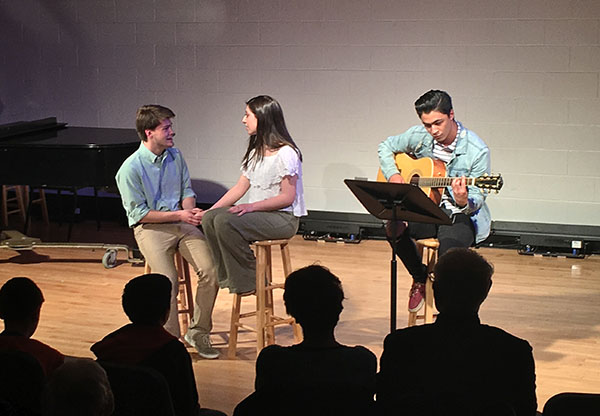Academy seniors take action through service

Singing for Service: Performing with Yael Sheinfeld and Kai Erber, Jack Riley (seated on the left), senior academy student, sings a song with a message of love and acceptance. Riley held a concert on May 21 with the goal of raising money and collecting clothing for the WINGS program, which aims to provide services to domestic abuse victims. Other academy seniors participated in service projects that aligned with a global or local issue they chose to research.
May 26, 2017
As part of the Glenbrook Academy of International Studies senior curriculum, students are tasked with the assignment of researching a global or local issue that culminates in a research paper in tandem with a service component and a final presentation. Academites choose anything from environmental protection to local domestic abuse, and in doing so, bring light to possible solutions.
According to senior Jane Carpenter, the Academy curriculum’s goal is to educate students about being globally conscious and aware of societal interdependence. The senior project that follows is designed to exemplify this type of thinking.
“We’re taught more to focus our project around a global issue, that’s what we’ve been taught for the past four years: to be conscious citizens,” Carpenter said. “We’re really trying to understand and get to the root of the problem and our [projects] are just a small part of that.”
Carpenter explained that her avenue of research focused on pollution in the Great Lakes and freshwater availability. While she said that far-reaching pollution is important to recognize, she chose to target a local cause. For her service component, she participated in a beach sweep in downtown Chicago.
“I did a Great Lakes clean up at 63rd Street Beach which is […] near Hyde Park, the University of Chicago [and the] Museum of Science and Industry, and that beach is not really well taken care of,” Carpenter said. “There ended up being just three volunteers and a worker from the Shedd Aquarium, and within two hours we’d picked up fifty pounds of garbage from the beach.”
Senior Jack Riley chose a different route for his project, focusing instead on a local Chicago charity called the WINGS program which provides housing, services, and advocacy for domestic abuse victims. Riley’s project involved a recital and clothing drive to raise money for the charity. According to Riley, though his project is centered around domestic abuse victims, he says the theme of the recital was love.
“While we aren’t necessarily singing about a domestic abuse situation, we are singing about how strong and powerful love can be in helping us grieve and helping us move on and helping us become closer to one another,” Riley said.
Riley understands that his concert was intended to promote donations to the WINGS program, but he also hopes that on a broader level, his activism brought light to the issue of domestic abuse and its prevalence in all communities.
“The greatest thing is awareness,” Riley said. “People think that domestic abuse only happens to some people and it [will never happen to them] but it’s important to know that domestic abuse can happen anywhere. There are warning signs, there are things to look out for, and whether it’s you, your friend, or a family member, we need to see the signs.”
Another project, done by senior Jordan Zelvin, focused on raising money and awareness for the organization Rehabilitation Through the Arts (RTA), which sponsors exposure to the arts in prison systems. Zelvin explained that she has been researching how art heals and how it can help a person reframe their sense of humanity.
“[The program] brings theater, music and visual arts into the prison communities so that when they are reacclimated into society they have something positive to turn to and a way to sort of reframe their narrative so they’re not just seen as convicts,” Zelvin said.
In her fundraising efforts, Zelvin has been making and selling bracelets for RTA. She initially wanted to volunteer and direct one of their shows, but she was not old enough to be able to. Instead, Zelvin chose to direct a one act play this year to get a similar experience.
“Service isn’t just about raising money and funds. Sometimes that’s the only thing you can do and that does help, but I think there’s so much more merit in actually going out and doing something for your service,” Zelvin said. “To reframe how I thought about these theater programs and how I could help heal the people in the prison systems, I decided to direct a one act [play] this year so I could see what these prisoners might be going through and what they might be feeling in the stress of a production.”
For her project, senior Grace Cepeda has been conducting a letter-writing campaign to local Illinois house representatives to raise awareness about HIV healthcare. Although she understands that the workload requires extra effort in an already busy senior year, Cepeda reflected positively on the project itself.
“We are still expected to keep up with our other classes, which is a disadvantage,” Cepeda said. “But the point of the project is that you’re doing something that you’re passionate about, so for me it wasn’t such a big deal because this is something I’ve been wanting to do since I started learning about the HIV crisis. This project really gave me an opportunity to hone in on what I care about and take the time to learn, which was a great freedom to have.”


